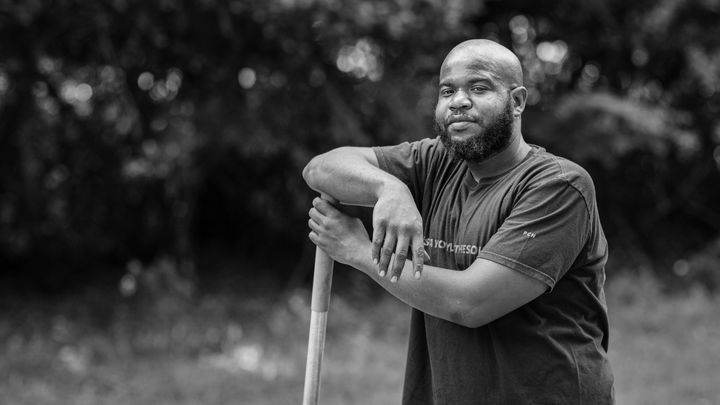
Agricultural Educational 'Tour' to Underserved Communities
Donation protected
Title:
Sowing Seeds of Health and Hope: Bringing Agricultural Education to Underserved Communities
About me:
In my community I'm known as Farmer Rich , the youth my call me Young Harvest and Richard Anthony Myers is given name which literally means 'King leading Farmer'. That being said I am convinced i was sent to earth to either help others with agriculture or lead them to agriculture in some form and this project is a cause of this belief.
Growing up, I discovered the life-changing potential of gardening and nutrition. From planting the first seed to harvesting and cooking a meal, I saw how these simple acts could connect people to nature, their health, and one another.
Since a kid I knew that I wanted to help feed people in some way shape or form, rather through culinary or cultivation which led me to study Horticulture , the art and science of plants. So, along with growing produce Ive created workshops, classes, wrote pdfs & books all with the love of spreading the Agricultural knowledge I’ve gained over the years.


At this point on my journey, I’m on a mission to transform lives by teaching people how to grow, cook, and live healthier—no matter their circumstances. My passion lies in empowering individuals and families to take control of their health and well-being by making fresh, nutritious food accessible, sustainable, and practical.
So Now, I'd like to share the knowledge I've gained with others preferably in underprivileged communities that face the greatest challenges in accessing fresh, healthy food.
Why This Mission Matters
In many underprivileged neighborhoods across the United States, food deserts and systemic inequities make it nearly impossible for families to access fresh produce or understand how to integrate healthy foods into their daily lives. By teaching people how to grow vegetables and herbs, prepare nutritious meals, and adopt sustainable agricultural practices, we can tackle these barriers and create lasting change.
But this mission isn’t just about growing food—it’s about cultivating hope, resilience, and a sense of self-sufficiency. With practical knowledge and the right tools, anyone can create a healthier future for themselves, their families, and their communities, no matter their budget or space constraints.
The Vision: A Modern-Day Jesup Wagon

I’m inspired by the work of George Washington Carver and his Jesup Wagon, which brought agricultural education directly to farmers in need during the early 20th century. I aim to build on his legacy with a modern twist—a mobile, hands-on educational tour that travels across the country, focusing on underserved neighborhoods.
The tour will offer workshops and demonstrations on topics such as:
- Growing vegetables, herbs, and fruits in small spaces or large-scale areas.
- Understanding soil health, composting, and other sustainable practices.
- Cooking affordable, nutritious meals with locally grown produce.
- Exploring the benefits of eating fresh, healthy foods for physical and mental well-being.
- Adapting agricultural practices for no-budget, low-budget, and high-budget households.
This project will not only provide practical skills but also inspire a movement toward healthier, more sustainable communities.
How Your Support Will Help
With your help, I can make this vision a reality and bring meaningful change to the lives of countless individuals and families. Your contributions will support:
1. Supplies for Workshops: Seeds, gardening tools, soil, containers, educational materials, and cooking ingredients for participants to take home.
2. A Mobile Learning Hub: A vehicle outfitted with the necessary tools and equipment to provide hands-on education wherever it’s needed.
3. Community Events:Free or low-cost classes, workshops, and demonstrations in schools, community centers, churches, and more.
4. Travel Expenses: Fuel, lodging, and logistical costs to ensure we can reach even the most remote neighborhoods.
5. Outreach and Partnerships: Building networks with local organizations to amplify the impact of this project and leave lasting resources in each community.
Why Now?
The need for this initiative has never been greater. Rising food prices, growing health disparities, and the ongoing effects of climate change have made it critical for communities to have the knowledge and resources to produce their own food sustainably. By equipping people with these tools, we can combat food insecurity, improve public health, and create a more equitable future.
Join Me in Making a Difference
This project is about more than just food—it’s about empowerment. By supporting this mission, you’re helping to sow seeds of change in communities that need it most. Together, we can teach families how to grow their own food, nourish their bodies, and build stronger, healthier neighborhoods.
Thank you for believing in this vision. Every contribution, no matter how small, brings us one step closer to a healthier, more sustainable future for all.
Financial Break Down:
1. Initial Vehicle and Equipment Costs
- Mobile Learning Hub/Vehicle: $30,000–$50,000
- A van, RV, or small bus, depending on your needs.
- Includes modifications like storage, teaching stations, and possibly solar panels for sustainable power.
- Gardening Tools and Equipment: $2,500
- Seeds, soil, pots, gardening gloves, tools, compost bins, etc.
2. Workshop Materials
- Educational Resources: $3,000
- Printed guides, take-home kits, digital resources.
- Cooking Supplies: $3,500
- Cooking utensils, portable stoves, ingredients for demonstrations.
3. Travel and Logistics
- Fuel Costs: $6,000–$10,000
- Depends on the length of the tour and the number of stops.
- Lodging and Food:$3,000–$6,000
- If you're staying in hotels, hostels, or campgrounds during the tour.
- Event Fees: $1,000–$3,000
- Renting spaces, permits, or setup fees in various communities.
4. Outreach and Marketing
- Promotion: $2,000–$4,000
- Website development, social media advertising, and printed materials.
- Partnerships and Networking: $1,000–$2,000
- Building relationships with community groups and schools.
5. Contingency Fund
- Unexpected Costs: $5,000–$10,000
- Repairs, emergencies, or additional supplies as needed.
6. 10% to Go fund me
- $10,000
Estimated Total
A good starting goal would be
-$50,000–$100,000
-Small-Scale price projection (Local/Regional Focus); $30,000–$50,000
- National Tour price projection: $75,000–$100,000+
Organizer
Richard Myers
Organizer
Bridgeport, CT